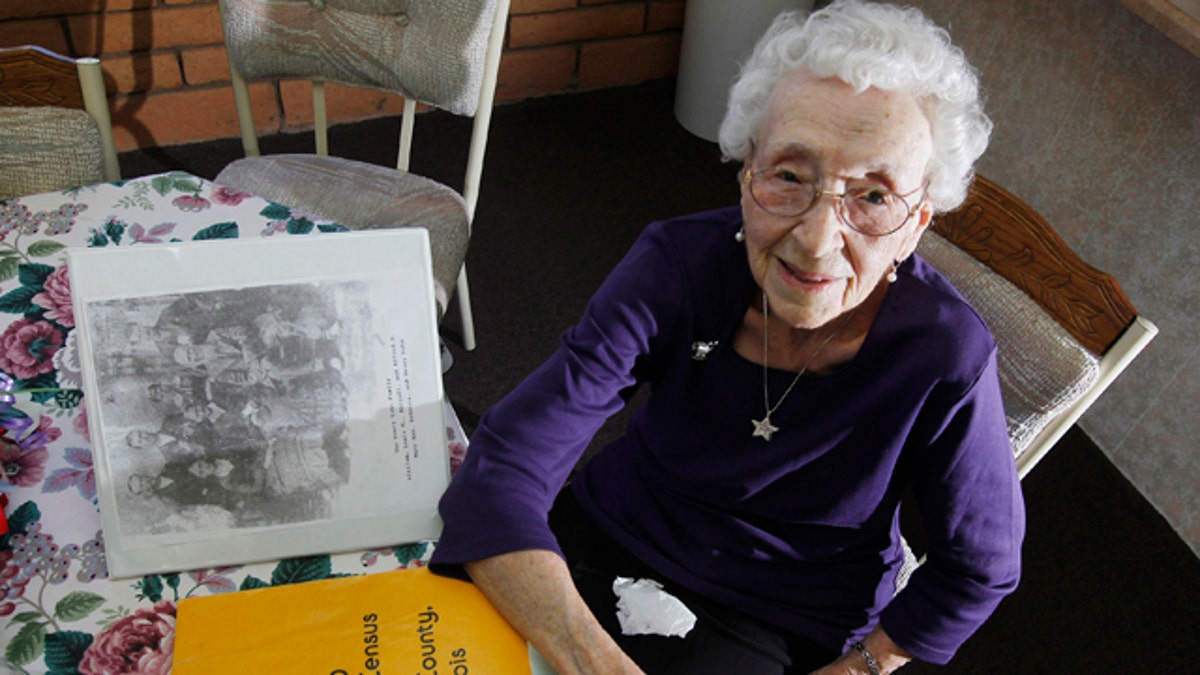
March 30, 2012: Verla Morris, who will turn 100 later this year, poses for a photograph as she goes through some of her family census data from the 19th and 20th centuries at her local residential senior center in Chandler, Ariz. (AP)
The National Archives has brought in a third-party company to fix problems with its online database of 1940 Census records, after it was unable to handle the millions of users who flooded the website.
Nearly 2 million people flocked to the site in just the first few hours after the Archives posted a searchable database of materials from the 1940 national head count.
On its Twitter page, the Archives repeatedly urged the public to be patient, as the agency brought in company Inflection to fix the system. The Archives tweeted that the system should improve going into the evening.
The 1940 Census contains detailed information on the 132 million people living in America at that tumultuous time. Of them, more than 21 million in the U.S. and Puerto Rico are still alive today.
Though a search-by-name feature is not yet available, the Archives site does allow people to search by location. The site is free and open to anyone.
The archive is massive. An early snapshot of its contents provided by the Census Bureau painted the picture of a very different country -- sample professions in 1940 included frame spinners and rivet heaters. In 2010, computer programmers and human resource managers were more common.
In 1940, there were 5.1 million farmers. Today there are 613,000. The cost of the 1940 Census was $67.5 million. In 2010, it was $12.4 billion.
uReport: Send videos and photos of your genealogical hunt >>
Several famous names are among those still alive today who were counted in 1940, including Clint Eastwood and Morgan Freeman.
The records, which include names, addresses and -- in the case of the 1940 census, income and employment information -- are rich with long-veiled personal details.
Every decade since 1942, the National Archives has made available records from past censuses.
The records, which include names, addresses and income and employment information, are rich with long-veiled personal details.
Some privacy advocates have opposed releasing such large amounts of personal information about living people.
The American Civil Liberties Union has for more than 30 years opposed any unrestricted release of census records.
Jay Stanley, a senior policy analyst at the ACLU, said harm could come from combining the 1940 census data with other information.
"Computer technology today allows you to take information from different sources and combine it into a very high-resolution image of somebody's life," he said. "Each particular piece of information might just be one pixel. But when brought together, they become very intrusive."
But Census Bureau spokesman Robert Bernstein said in an email that any fears the data could be used to harm anyone living today "such as through identity theft" were alleviated when the archives said no birthdates or Social Security numbers would be in the records.
Susan Cooper, a spokeswoman for the National Archives, said the agency did not do a privacy impact assessment of the records. She said archives officials did not know of any complaints from the public about the impending release.
Robert Gellman, a privacy and information consultant, said he doubted the records would be of much value to crooks, given how easy it is to obtain personal information on the Internet.
"There's nobody out there complaining about 70-year-old records being used against them," he said.
The Associated Press contributed to this report.

